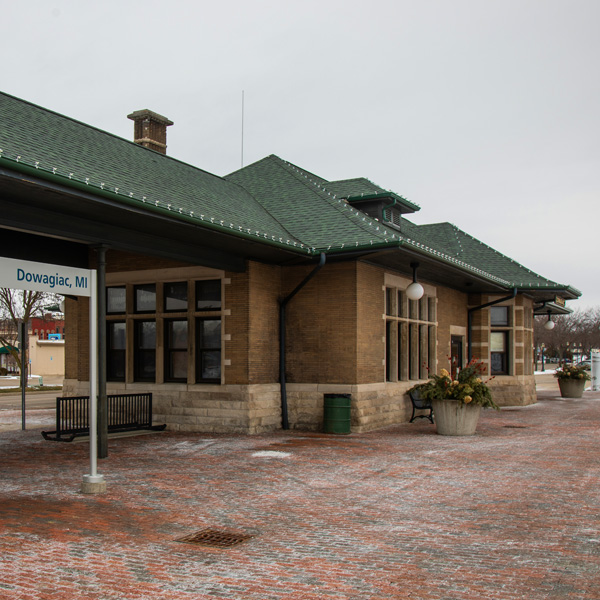Dowagiac, MI (DOA)
Dowagiac was platted when the Michigan Central came through in 1848. The depot was carefully restored in the mid-1990s following listing on the National Register of Historic Places.

200 Depot Drive
Dowagiac, MI 49047-1448
Annual Station Ridership (FY 2024): 5,031
- Facility Ownership: City of Dowagiac
- Parking Lot Ownership: City of Dowagiac
- Platform Ownership: Amtrak
- Track Ownership: Amtrak
Marty Sandoval
Regional Contact
governmentaffairschi@amtrak.com
For information about Amtrak fares and schedules, please visit Amtrak.com or call 1-800-USA-RAIL (1-800-872-7245).
The historic brick station in Dowagiac was built in 1903 to replace a wooden 1870s station. It sits one block from City Hall. Architects Frederich Spier and William C. Rohns, who also built the Niles station, constructed the brick Tudor Revival Dowagiac station for the Michigan Central Railroad (MCRR). Today, passengers share the well-maintained city-owned station with the Greater Dowagiac Chamber of Commerce and Whistlestop Gifts, their retail boutique. Tall mullioned windows surround the lower floor, picked out in a pale stone, and a central one-and-a-half story tower with decorative crenelations faces the street side of the station, which is otherwise hip-roofed. Interior paneling, benches and woodwork maintain the waiting room’s quiet charm, and an original floor mosaic spelling out MCRR remains in excellent condition. Amtrak is the MCRR’s successor as the track owner.
This station was added to the National Register of Historic Places in 1993. During the city’s redevelopment projects of the 1990s, the city and its Downtown Development Authority rehabilitated the depot; carefully restoring it in 1995. The entire downtown rail corridor was enhanced that year during the community’s $1.8 million Depot Drive Redevelopment project created to serve the future of high-speed rail travel between Chicago and Detroit.
The exterior and the waiting room woodwork were refinished in the 1995 restoration, and a wall was added to form the gift shop. The train platform was also replaced at that time. The city not only restored their station but also their downtown in order to prevent the erosion of the business district. It was determined that one of the greatest assets of the town was the existing architecture, and the community made use of a series of grants to enhance the downtown area with an attractive streetscape and to restore and improve commercial building facades.
When American settlers first came to the Dowagiac area, they found it occupied by the Potawatomi native peoples. Most of the tribes moved west beginning in 1838, except for the Pokagon Band, who still maintain their headquarters in Dowagiac today.
An early settler, William Renesten, built a carding mill on Dowagiac Creek in 1830, and later a grist mill, with the damming of the creek and creation of the mill pond. While initially planted in wheat, using the locally manufactured roller grain drill, the area later proved to be excellent for the cultivation of fruit trees, blueberries, peppermint, vegetables, and livestock. Continuing with the Potawatomi legacy, maple syrup was also produced.
Dowagiac was platted when the Michigan Central came through in 1848 to establish a route from Detroit to Niles; and the village was incorporated in 1858, growing to becoming a city in 1877. In addition to manufacturing the roller grain drill—which planted and covered grain seeds in one operation—one resident, James Heddon, invented a highly successful artificial fishing lure as a result of his fishing in the mill pond.
However, Dowagiac is best known for the establishment and production of the Round Oak Stoves by the village’s first mayor, P.D. Beckwith, in 1868. The Michigan Central contracted to supply all of its depots with these then-innovative heating stoves in the 1870s, and as a result of this startup, the Round Oak Stove Company reigned as one of the town’s major economic drivers for fifty years and became the largest stove company in the U.S. in the 1880s. Round Oak Stoves eventually took up more than one million square feet of manufacturing space and employed more than 1,000 residents in a complex where Ameriwood turns out ready-to-assemble furniture today. A collection of these stoves may be seen on display at the depot.
Dowagiac had grown by 1920 from a main railroad track and three sidings to nine sidings and spurs to supply the growing factory community. Other legacy businesses still survive: the Judd Lumber Company founded in 1859, the oldest in Michigan; and the Caruso Candy and Soda Shoppe, an authentic soda fountain family-owned and operated since 1922.
The Blue Water and Wolverine Service are financed primarily through funds made available by the Michigan State Department of Transportation.
Station Building (with waiting room)
Features
- ATM not available
- No elevator
- No payphones
- No Quik-Trak kiosks
- Restrooms
- Unaccompanied child travel not allowed
- No vending machines
- No WiFi
- Arrive at least 0 minutes prior to departure
Baggage
- Amtrak Express shipping not available
- No checked baggage service
- No checked baggage storage
- Bike boxes not available
- No baggage carts
- Ski bags not available
- No bag storage
- Shipping boxes not available
- No baggage assistance
Parking
- Same-day parking is available; fees may apply
- Overnight parking is available; fees may apply
Accessibility
- No payphones
- Accessible platform
- Accessible restrooms
- No accessible ticket office
- Accessible waiting room
- No accessible water fountain
- Same-day, accessible parking is available; fees may apply
- Overnight, accessible parking is available; fees may apply
- No high platform
- No wheelchair
- Wheelchair lift available
Hours
Station Waiting Room Hours
| Mon | 08:00 am - 05:00 pm |
| Tue | 08:00 am - 05:00 pm |
| Wed | 08:00 am - 05:00 pm |
| Thu | 08:00 am - 05:00 pm |
| Fri | 08:00 am - 05:00 pm |
| Sat | 10:00 am - 10:00 pm |
| Sun | 10:00 am - 10:00 pm |
Ticket Office Hours
Passenger Assistance Hours
Checked Baggage Service
Parking Hours
| Mon | 24 HOURS |
| Tue | 24 HOURS |
| Wed | 24 HOURS |
| Thu | 24 HOURS |
| Fri | 24 HOURS |
| Sat | 24 HOURS |
| Sun | 24 HOURS |


 Amtrak established the Great American Stations Project in 2006 to educate communities on the benefits of redeveloping train stations, offer tools to community leaders to preserve their stations, and provide the appropriate Amtrak resources.
Amtrak established the Great American Stations Project in 2006 to educate communities on the benefits of redeveloping train stations, offer tools to community leaders to preserve their stations, and provide the appropriate Amtrak resources. Amtrak is seizing a once-in-a-lifetime opportunity to transform rail and Retrain Travel. By modernizing, enhancing and expanding trains, stations and infrastructure, Amtrak is meeting the rising demand for train travel. Amtrak offers unforgettable experiences to more than 500 destinations across 46 states and parts of Canada. Learn more at
Amtrak is seizing a once-in-a-lifetime opportunity to transform rail and Retrain Travel. By modernizing, enhancing and expanding trains, stations and infrastructure, Amtrak is meeting the rising demand for train travel. Amtrak offers unforgettable experiences to more than 500 destinations across 46 states and parts of Canada. Learn more at